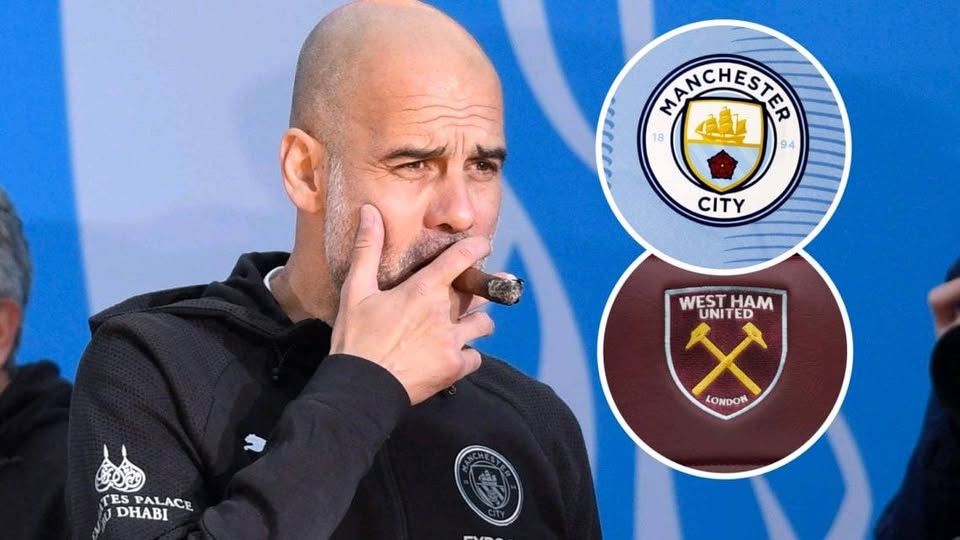Former Westham player agreed personal deal with man city

This connection extends far beyond mere sentiment, manifesting itself through a continuous exchange of talent, ideas, and personnel between the two institutions. The flow of players between Manchester City and West Ham reads like a who’s who of English football’s recent history: Steve Lomas, Ian Bishop, Eyal Berkovic, Carlos Tevez, and Pablo Zabaleta have all represented both clubs with distinction, each bringing their unique qualities and experiences to different chapters of both clubs’ stories.
More recently, Manchester City’s recruitment strategy has increasingly focused on identifying and nurturing young talent from West Ham’s renowned academy system. Prospects like Divine Mukasa and Divin Mubama have made the journey from East London to Manchester, representing the ongoing pipeline of talent that connects these two clubs and highlighting City’s recognition of West Ham’s ability to develop promising young players.
The Managerial Merry-Go-Round
The interconnection between these clubs extends beyond the playing field into the technical areas and coaching boxes. Manuel Pellegrini, the distinguished Chilean tactician, enjoyed successful spells at both institutions, bringing his sophisticated approach to football management to different contexts and challenges. Stuart Pearce, another figure who bridged both worlds, contributed his wealth of experience and tactical acumen to both Manchester City and West Ham United at different stages of his career.
Perhaps most significantly in the context of this developing story, Enzo Maresca’s journey exemplifies the career trajectory that Diamanti might now be embarking upon. The Italian midfielder-turned-coach began his coaching education as an assistant at West Ham under Pellegrini’s tutelage, absorbing valuable lessons about man-management, tactical preparation, and the demands of Premier League football. This foundation proved invaluable when Maresca subsequently joined Guardiola’s coaching staff at Manchester City, where he witnessed firsthand the meticulous attention to detail and innovative thinking that has made the Spaniard one of the most successful managers in world football.
Maresca’s progression from West Ham assistant to Manchester City coach, and eventually to Leicester City manager where he guided the Foxes to Premier League promotion, demonstrates the potential career trajectory available to ambitious coaches willing to learn and adapt. His success story provides a compelling template for what Diamanti might achieve if he successfully integrates into Guardiola’s sophisticated coaching ecosystem.
Diamanti: The Maverick Who Captured Hearts
Alessandro Diamanti’s initial chapter at West Ham United was brief but undeniably memorable, a concentrated burst of brilliance that left an indelible mark on the club’s recent history. During the 2009-10 season, the Italian arrived at Upton Park carrying expectations and a reputation for flair that immediately endeared him to the Hammers faithful. His tenure, though lasting just one campaign, was characterized by moments of genuine magic that showcased his technical ability, tactical intelligence, and unwavering commitment to entertaining football.
In his solitary season wearing the claret and blue, Diamanti managed to score eight goals while consistently demonstrating the kind of creativity and vision that separates truly gifted players from the merely competent. His left foot was a thing of beauty, capable of producing passes, crosses, and shots that defied logic and left defenders scrambling to cope with his unpredictability. More impressively, his performances were recognized by his peers and supporters alike, earning him the runner-up position in the club’s prestigious Hammer of the Year award—a remarkable achievement considering he finished second only to Scott Parker, who was in the midst of one of his finest individual campaigns.
What made Diamanti particularly special was not just his technical ability, but his infectious personality and obvious love for the game. He possessed that rare quality among modern footballers—an apparent joy in playing that was transmitted directly to the supporters who watched him perform. His exuberant celebrations, passionate commitment to every match, and genuine appreciation for the club’s traditions made him an instant favorite among the Upton Park faithful.
The Italian’s emotional connection to West Ham has persisted long after his departure from the club. Recent social media posts showing Diamanti and his son proudly wearing West Ham kits demonstrate that his affection for the club remains genuine and heartfelt. In reflecting on his time in East London, Diamanti’s words carry the weight of authentic emotion: “I’ll never forget my time at West Ham. The passion, the fans, and the energy at Upton Park – unbelievable memories. I was only there for a short time, but the support was unforgettable… West Ham will always hold a special place in my heart.”
The Melbourne City Apprenticeship
Following his playing career, Diamanti has been quietly building his coaching credentials at Melbourne City, Manchester City’s Australian affiliate club. This positioning within the City Football Group ecosystem has provided him with invaluable exposure to the organization’s coaching methodologies, philosophical approaches, and operational standards—experience that has undoubtedly prepared him for a potential role at the parent club.
At Melbourne City, Diamanti has been working with youth players, a role that requires not only tactical knowledge but also the ability to develop young minds and instill the mental fortitude necessary for professional football. His approach to coaching reflects his playing personality—passionate, demanding, and uncompromising in his pursuit of excellence. He treats his young charges as professionals, recognizing that the transition from youth football to senior level requires more than just technical development.
“My first quality all my life is my passion for the game,” Diamanti explains when discussing his coaching philosophy. “Tactics and technique are important, but mentality is everything. I treat my players like they’re in Serie A already… I push them hard and tell them it’s on them to take responsibility and succeed.”
This emphasis on mental strength and personal accountability aligns perfectly with Guardiola’s own coaching philosophy, which places enormous emphasis on psychological preparation and the development of players who can think independently within structured tactical systems. Diamanti’s experience as a creative player who often had to make split-second decisions under pressure provides him with unique insights into the mental aspects of the game—insights that could prove invaluable when working with Manchester City’s talented squad.
Guardiola’s Coaching Revolution
Pep Guardiola’s approach to building and maintaining his coaching staff has always been characterized by meticulous planning and a willingness to embrace fresh perspectives. The anticipated departures of Juanma Lillo and Inigo Dominguez this summer represent more than just routine staff changes—they signal Guardiola’s recognition that sustained success requires constant evolution and the injection of new ideas into established systems.
Lillo, in particular, has been a crucial figure in Guardiola’s coaching setup, bringing decades of tactical knowledge and a philosophical approach to football that has influenced some of the world’s greatest coaches. His departure creates a significant void that requires someone with both tactical acumen and the personality to contribute meaningfully to City’s already sophisticated coaching environment.
Diamanti’s potential appointment represents a fascinating choice that combines several appealing elements for Guardiola. First, his experience as a creative midfielder provides him with insights into the kind of technical and mental challenges faced by City’s attacking players. Second, his passionate personality and demanding coaching style could bring a different energy to training sessions and tactical discussions. Third, his work within the City Football Group system means he already understands the organizational culture and philosophical principles that underpin Manchester City’s approach to football.
The Italian’s fiery temperament and emotional investment in football could provide an interesting counterbalance to Guardiola’s more cerebral approach to the game. While the Catalan is renowned for his tactical innovations and systematic thinking, Diamanti’s raw passion and instinctive understanding of football’s emotional dimensions could add a valuable new dimension to City’s coaching setup.
West Ham’s Pattern of Missed Opportunities
The potential loss of Diamanti to Manchester City’s coaching staff raises uncomfortable questions about West Ham United’s ability to identify and nurture coaching talent from within their own ranks. This situation bears uncomfortable similarities to the Enzo Maresca case, where West Ham failed to recognize the potential of a promising coach who subsequently flourished elsewhere.
Maresca’s journey from West Ham assistant to Manchester City coach to successful Leicester City manager demonstrates exactly the kind of career progression that ambitious coaches seek. His success in guiding Leicester to Premier League promotion has established him as one of English football’s most promising young managers, yet West Ham seemingly never considered him for their own managerial position despite his familiarity with the club and his proven ability to work effectively within their organizational structure.
This pattern suggests a broader issue within West Ham’s approach to identifying and developing coaching talent. While the club has invested significantly in their academy and training facilities, their ability to translate former players and coaches into successful appointments has been less impressive. The potential loss of Diamanti to Manchester City represents another missed opportunity to tap into the passion, knowledge, and emotional connection that former players often bring to coaching roles.
Diamanti’s enduring affection for West Ham, demonstrated through his public statements and social media presence, suggests that he might have been receptive to a coaching role at his former club. His understanding of the club’s culture, his popularity among supporters, and his developing coaching credentials could have made him an ideal candidate for a role within West Ham’s coaching structure. Instead, Manchester City appears poised to benefit from his talents and potential contributions.
The Broader Implications
The potential appointment of Diamanti to Manchester City’s coaching staff represents more than just another personnel change—it symbolizes the different approaches that ambitious and successful clubs take toward talent identification and development. Manchester City’s willingness to invest in coaching potential, to provide pathways for development within their organizational structure, and to take calculated risks on promising coaches contrasts sharply with the more conservative approaches adopted by many other clubs.
For West Ham, this situation serves as a reminder of the importance of maintaining connections with former players and staff members who retain genuine affection for the club. In an era where football success increasingly depends on marginal gains and the accumulation of talent across all areas of operation, the failure to capitalize on existing relationships and emotional connections represents a significant oversight.
The irony of the situation is particularly acute given the unique bond that exists between Manchester City and West Ham supporters. While fans of both clubs may celebrate this connection and appreciate the movement of personnel between their institutions, West Ham’s failure to benefit from Diamanti’s coaching development represents a missed opportunity that could have strengthened their own organizational capabilities.
Looking Forward: Lessons and Opportunities
As this story continues to develop, several important lessons emerge for both clubs and the broader football community. For Manchester City, the potential addition of Diamanti represents another shrewd investment in coaching talent that could pay dividends both in the short term and over the longer horizon. Guardiola’s track record of developing coaches and integrating diverse perspectives into his tactical approach suggests that Diamanti could flourish within the City ecosystem.
For West Ham, this situation provides an opportunity for reflection and learning. The club’s failure to retain or develop coaching relationships with former players who maintain emotional connections to the institution represents a significant oversight that should inform future decision-making. Building pathways for former players to develop coaching careers within the club’s structure could provide West Ham with access to passionate, knowledgeable coaches who understand the club’s culture and values.
The broader football community can observe this situation as an example of how successful clubs approach talent development across all areas of their operation. Manchester City’s systematic approach to identifying, developing, and integrating coaching talent provides a template that other ambitious clubs might consider adopting.
Conclusion: A Diamond in the Rough
As Alessandro Diamanti prepares for what could be the next chapter of his football journey, his potential appointment to Pep Guardiola’s coaching staff represents a fascinating convergence of talent, opportunity, and institutional vision. For Manchester City, the addition of a passionate, experienced coach with genuine understanding of English football and proven ability to develop young players could provide exactly the kind of fresh perspective that Guardiola seeks as he continues to evolve his tactical approach.
For West Ham United, the situation serves as a poignant reminder of roads not taken and opportunities missed. The club’s failure to capitalize on Diamanti’s coaching potential and emotional connection to the institution represents exactly the kind of oversight that ambitious clubs cannot afford to make repeatedly.
The story also highlights the complex web of relationships and connections that define modern football, where talent, opportunity, and vision intersect in unexpected ways. Manchester City’s success in identifying and developing coaching talent provides them with competitive advantages that extend far beyond their financial resources, while West Ham’s more reactive approach to coaching appointments may limit their ability to maximize the potential of their existing relationships and connections.
As this story unfolds, football observers will be watching to see whether Diamanti can successfully make the transition from beloved player to influential coach, and whether his passionate approach to the game can complement Guardiola’s sophisticated tactical system. If successful, his appointment could represent another masterstroke in Manchester City’s ongoing quest for sustained excellence.
For West Ham, the lesson is clear: in modern football, success requires not just investment in players and facilities, but also the vision to identify and nurture coaching talent from within existing networks and relationships. The potential loss of Alessandro Diamanti to Manchester City represents exactly the kind of missed opportunity that ambitious clubs must learn to avoid if they hope to compete at the highest levels of the game.















